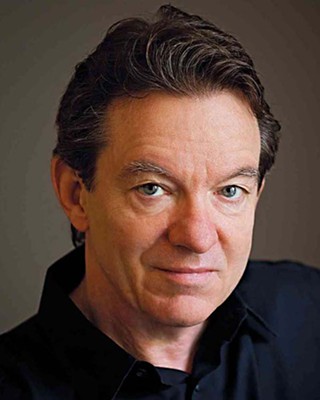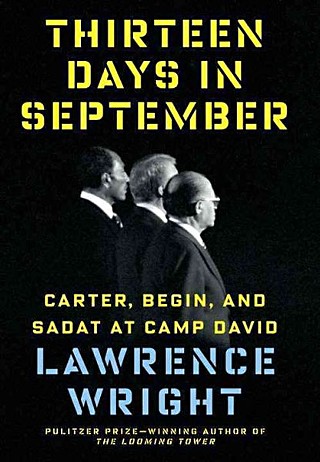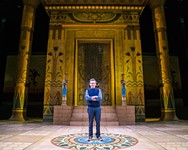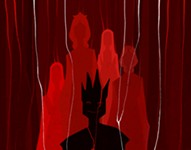Exceeding Themselves
Lawrence Wright's Thirteen Days in September tells how Carter, Sadat, and Begin made an impossible peace
By Robert Faires, Fri., Oct. 24, 2014
The incessant stream of reports about rocket attacks, airstrikes, invasions, and reprisals in the Middle East make it seem that the region is never without war and strife. But Austin author and journalist Lawrence Wright reminds us of a moment in the not-too-distant past when peace was brokered between two of its bitterest enemies, Israel and Egypt. His new book, Thirteen Days in September, recounts the period in 1978 when President Jimmy Carter invited Egyptian President Anwar Sadat and Israeli Prime Minister Menachem Begin to Camp David and, against all odds, forged an agreement between their countries that still endures 35 years later.
Wright first tackled the subject as a play, commissioned from him by Arena Stage in Washington, D.C. Camp David, which premiered in March 2014, keeps the focus tight, with only Begin, Sadat, Carter, and First Lady Rosalynn Carter represented onstage. (For the premiere, Richard Thomas played Carter, Hallie Foote played Rosalynn, Ron Rifkin was Begin, and Egyptian actor Khaled Nabawy was Sadat.) Though Wright calls the production "one of the most rewarding experiences of my life," he also felt compelled to expand upon it in a book, to give full scope to not only the negotiations and the other key players in the three delegations but also the histories of the three heads of state and of the Middle East itself. Here, Wright provides more details on the book's genesis and subject.
Austin Chronicle: We're used to seeing nonfiction books adapted into dramatic form, but it isn't often that we see a drama turned into a book. Did starting with a play inform the tenor of the book at all? Did this book feel any different than any of your other books?
Lawrence Wright: It was nice to have a template already laid down. I knew there was a lot of drama packed into those 13 days, so I felt comfortable knowing the arc of the story. It was already apparent to me. But there was so much more to say than I could fit into a play. There was that complexity and those other characters that I wanted to flesh out.
AC: The book has this feel of the clock always ticking, not just during the negotiations at Camp David, but even in the sections where you take the reader deep into the backgrounds of these men. It's like there's been a countdown for centuries, and if the peace effort at Camp David doesn't take, it may be generations until another opportunity for peace comes along. Was that part of what kept people at the table even as they resisted proposals and said they wanted to leave? What kept them there?
LW: Carter forced them to stay. He even blocked them from physically leaving the room sometimes. He made it clear that if either the Israelis or the Egyptians left, he would hold them responsible. When Sadat ordered the helicopter and packed his bags, Carter told them that this would cause a rupture of American-Egyptian relations, the end of their friendship, and Egypt would be alone and friendless in the world for generations. Similarly, when on a couple of occasions Begin wanted to bolt, Carter said, "I will make sure the American people will know who's responsible for the breakdown of the talks. I will go to Congress tomorrow." He even had one of his speechwriters draw up a speech in which Carter was going to ask the Israeli people to vote down their government. So he made it really clear that there would be genuine, severe consequences if either of these delegations left Camp David.
AC: There's that wonderful quote of [Israeli Defense Minister Ezer] Weizman's in which he says he feels like they're in a World War II submarine movie – all trapped down in this thing with Carter at the periscope.
LW: Yeah, they really did feel trapped, and of course, Begin and Sadat had both had lengthy prison experiences, and they really felt the confinement. And ironically, Carter felt that the isolation at Camp David would help them clear their minds and get away from the press and domestic political considerations, but cabin fever also played a role. They were dying to get out of there, and that was an additional reason that they finally found their way to peace.
AC: You bring up Carter, and the popular image of him is as the soft-spoken, sweater-wearing Sunday school teacher – Mister Rogers as president. But you create a very different portrait of him, thinking like an engineer in tackling the problems of this peace deal and getting furious and blowing up at Begin and Sadat. Were there aspects of Carter's character that you were surprised by as you researched this, and what about him were you most interested in telling the reader?
LW: You know, it was not my goal when I set out to rehabilitate Jimmy Carter's image. I lived in Atlanta when he was governor and when he ran for president, and he was a good governor. But I saw him as a weak and feckless president. But the man I encountered in Camp David was anything but that. I think it was true of all three of these leaders that they exceeded themselves. They were very flawed men, and in the case of Sadat and Begin, they had a copious amount of blood on their hands. And they're not the kind of people that you would normally think would get together and forge a peace, but they somehow did that.
With Carter, the flaws in his personality at Camp David were turned into virtues. For instance, he had a famous tendency to micromanage events, even governing the hours that his aides could spend on the tennis court at the White House. Jim Fallows, his former speechwriter, said that he would discuss everything from abortion to zero-based budgeting in alphabetical order. So he had this engineer's emotional tone-deafness, and he would perseverate on details that others would walk by. It turns out that micromanaging and attention to detail and the kind of emotional bluntness that were all a part of his character were essential at Camp David. He mastered the material in a way that nobody else at Camp David was able to do. Hans Mark, later chancellor at the University of Texas but at that time head of the National Reconnaissance Office, told me that during Camp David he was asked to provide a large map of Sinai, so he sent over a large map, and they said, "No, a big map!" They wanted something like – in the book I think I had the dimensions as 17 by 20 feet – the size of a room! So you couldn't slip anything by [Carter]. He knew where every jeep and wadi [was]; everything in Sinai he had under his fingertips.
AC: One comes away from the book with a clear sense of the monumental risks taken by all three heads of state in going to this place, and it's difficult to imagine many heads of state today taking risks that big for such a cause. Do you have any idea what it would take to pursue peace in the current climate?
LW: Conventional wisdom says that peace requires ideal partners, and I think that one of the lessons of Camp David is that's not true. The people that went to Camp David are: Jimmy Carter, a weak and unpopular president; Anwar Sadat, a Nazi collaborator and assassin; and Menachem Begin, a terrorist leader. Now, can you imagine a less likely cast of characters to forge peace? But they did it. What they did have in common was an abundant amount of political courage, and that may be the lacking ingredient [today]. But that made a big difference at Camp David. They all exceeded themselves. The flaws in their personalities were evident all the way through these 13 tumultuous days, but they were able to supersede their own limitations.
Lawrence Wright will speak about Thirteen Days in September at the Texas Book Festival on Saturday, Oct. 25, 12:30pm, at Central Presbyterian Church, 200 E. Eighth. For more info, visit www.texasbookfestival.org.














